Author Archives: Adrian Wan
Author Archives: Adrian Wan

The MANRS (Mutually Agreed Norms for Routing Security) Fellowship Program 2021 is now accepting applications. If you are an emerging leader eager to improve the well-being of the Internet’s global routing system, apply now.
The program gives highly motivated individuals the chance to work alongside MANRS Ambassadors – industry leaders participating in the associated Ambassador Program that invited applications last month (details here).
Together, they will train diverse communities on good routing practices, analyze routing incidents, research into ways to secure routing, and survey the global policy landscape.
You can read about the 13 Fellows in last year’s inaugural program, which proved highly popular. The Internet Society supports this program as part of its work to reduce common routing threats and establish norms for network operations.
You can apply for a MANRS Fellowship in three different areas: training, research, and policy. Each Fellow will receive a stipend of $750 a month. The program will start in mid-April and run for up to eight months. You can apply for more than one category but will only be selected for one of them.
Online Training
Responsible for: Conducting MANRS online tutorial and virtual hands-on workshops, helping improve existing training and workshop Continue reading

The MANRS (Mutually Agreed Norms for Routing Security) Ambassador Program 2021 is now accepting applications. If you are an industry leader eager to improve the well-being of the Internet’s global routing system, apply now.
Ambassadors are representatives from MANRS participant organizations who show expertise and leadership in the routing security community. They are well-respected professionals committed to helping make the global routing infrastructure more robust and secure.
Ambassadors will work with MANRS Fellows, participants in an associated program that will invite applications next month. Together, they will train diverse communities on good routing practices, analyze routing incidents, research into ways to secure routing, and survey the global policy landscape.
You can read about the four Ambassadors in last year’s inaugural program, which proved highly popular. The Internet Society supports this program as part of its work to reduce common routing threats and establish norms for network operations.
You can apply to be a MANRS Ambassador in three different areas: training, research, and policy. Each Ambassador will receive a stipend of $1,500 a month. The program will start in mid-April and run for up to eight months. You can apply for more than one category but will only be selected for Continue reading

We’ve appointed four MANRS ambassadors in the areas of training, research, and policy. We’re excited to welcome Anirban Datta, Flavio Luciani, Boris Mimeur, and Sanjeev Gupta to the program, and can’t wait to benefit from their input and expertise.
Ambassadors are representatives from current MANRS participant organizations who provide mentorship, guidance, and feedback to others in the routing security community. With their wealth of experience and knowledge – and their passion and commitment – they help make the global routing infrastructure more robust and secure.
The MANRS Ambassadors Selection Committee, consisting of six representatives from the MANRS Advisory Group, assessed the applications and appointed four exceptional individuals.
They’ll receive a monthly stipend of US$1,500 for up to six months and together they’ll train people on good routing practices, analyze routing incidents, research ways to secure routing, and survey the global policy landscape. Ambassadors will also provide mentorship to the MANRS Fellows in their respective categories to help the Fellows to fulfill their obligations.
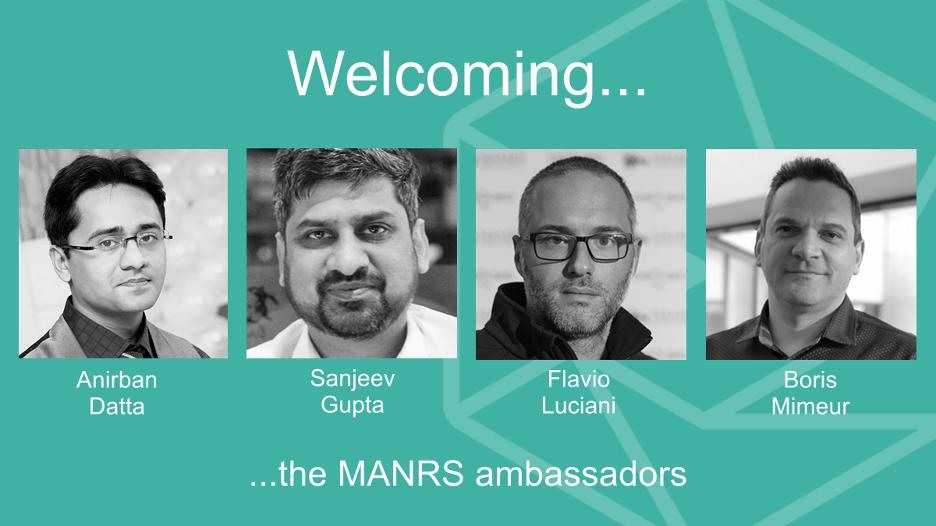
Anirban works for Fiber@Home Global Ltd in Dhaka, Bangladesh. His role is to establish international links and points of presence in different parts of the world. He’s also involved with Continue reading

The first-ever MANRS (Mutually Agreed Norms for Routing Security) Fellowship Program is now accepting applications. If you are an emerging leader eager to improve the well-being of the Internet’s global routing system, apply now.
The program gives highly motivated individuals the chance to work alongside MANRS ambassadors, who are industry leaders participating in the Ambassador Program. Together, they will train diverse communities on good routing practices, analyze routing incidents, research into ways to secure routing, and survey the global policy landscape.
Fellows will improve their skills and bring new perspectives and ideas to MANRS. They will also gain valuable insights and networking opportunities from well-respected professionals called MANRS Ambassadors under the MANRS Ambassadors Program. The selection process for this program is currently underway.
The Internet Society supports this program as part of its work to reduce common routing threats and establish norms for network operations.
You can apply for a fellowship in three different areas: training, research, and policy. Each fellow will receive a stipend of $750 a month. There is no age requirement and you can apply for more than one category but will only be selected for one of them.
Responsible for: Conducting MANRS online tutorial Continue reading

A World Economic Forum (WEF) report released today recommends that Internet Service Providers (ISPs) should strongly consider joining the Mutually Agreed Norms for Routing Security (MANRS) initiative to improve the security of the Internet’s global routing system.
Systemic security issues about how traffic is routed on the Internet make it a relatively easy target for criminals. MANRS helps reduce the most common routing threats and increase efficiency and transparency among ISPs on peering relationships.
The WEF Centre for Cybersecurity identifies four actionable principles as effective in preventing malicious activities from getting “down the pipes” from network providers to consumers in the report Cybercrime Prevention: Principles for Internet Service Providers, released today in Davos, Switzerland.
The principles were developed and tested over a year with leading ISPs around the world and multilateral organizations, including BT, Deutsche Telekom, Du Telecom, Europol, Global Cyber Alliance, Korea Telecom, Proximus, Saudi Telcom, Singtel, Telstra, and ITU, WEF says in a press release.
One of the principles is to “take action to shore up the security of routing and signalling to reinforce effective defence against attacks”, and MANRS, a global initiative supported by the Internet Society, is one of the recommendations to achieve the principle Continue reading
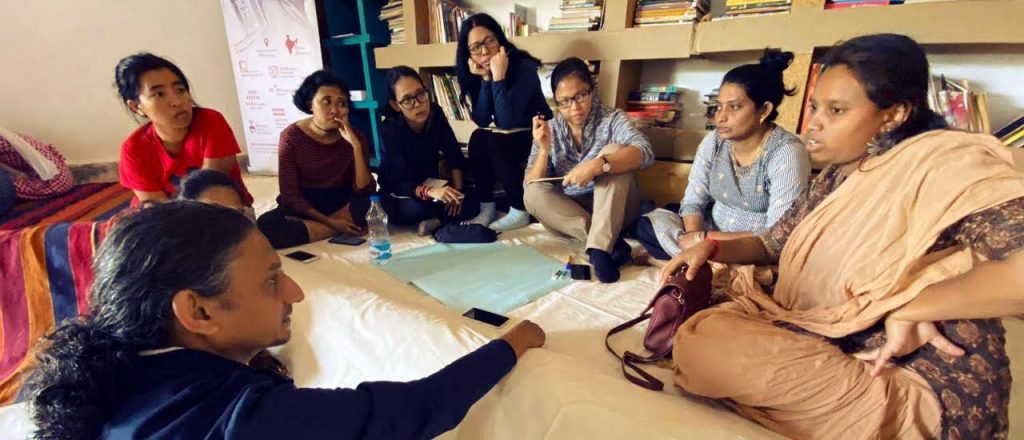
Last month, 40 community radio and network providers from all across Asia-Pacific journeyed by road from Bengaluru, India’s tech capital, to IruWay, a rural research lab about 80km away.
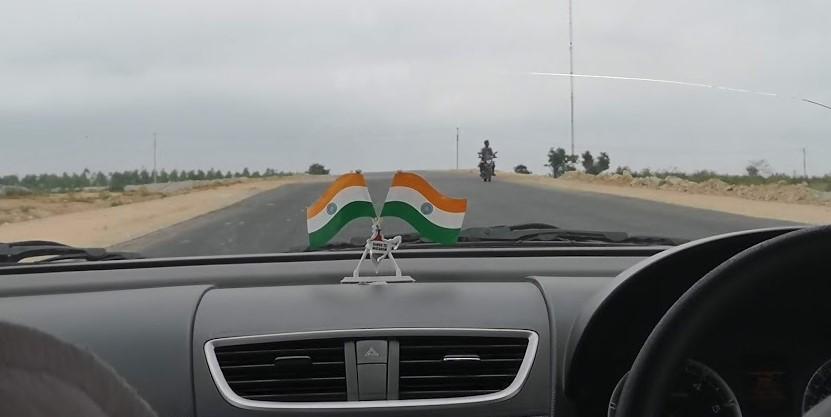
As the traffic and indiscriminate honking outside the megacity faded, Internet signal also weakened, and at some point, there was no connection at all – something that could make Internet-dependent city dwellers queasy. But the 40 participants traveling to attend the Community Network Exchange Asia-Pacific 2019 (CNX APAC) were undeterred. They have built or run radio or Internet networks for unconnected communities in many countries, including Bangladesh, Malaysia, Myanmar, Nepal, the Philippines and Thailand.
The event gathered the two groups, community radio and network providers. It was a bid to get communities that have community radio stations in place to also set up community networks – so that villages unserved by mobile network operators or Internet service providers can access the Internet and the benefits it offers.
Community radio stations play an important role in providing information to rural communities throughout the world. They have expertise in setting up the infrastructure as well as creating local content, both of which are crucial to the success of community networks. It is why the Continue reading

The Internet is changing. Consolidation in the Internet economy, the topic of the Global Internet Report 2019, might be the source of ongoing shifts in its underlying infrastructure and the way users engage, among many other things.
Clearly, the growing presence of big Internet platforms can benefit the user by offering seamless Internet experiences, but it could also harm innovation, competition, and the Internet’s broader architecture, says the report, which marks the start of the Internet Society’s efforts to examine this issue.
The Internet in Asia-Pacific is no exception. A few corporations – including Facebook and Tencent in social networking, Google and Baidu in search, and Amazon and Alibaba in online shopping – dominate large parts of the Internet, benefitting people while raising similar questions about what it means for the Internet’s fundamental properties.
This year’s Survey on Policy Issues in Asia-Pacific, released today, helps deepen our understanding of the role that corporations play in shaping Internet use and user experience in the region and how they may impact future innovation on the Internet.
More than 1,300 people from 39 economies in the region took our online survey when we opened it to the public in July.
The Continue reading
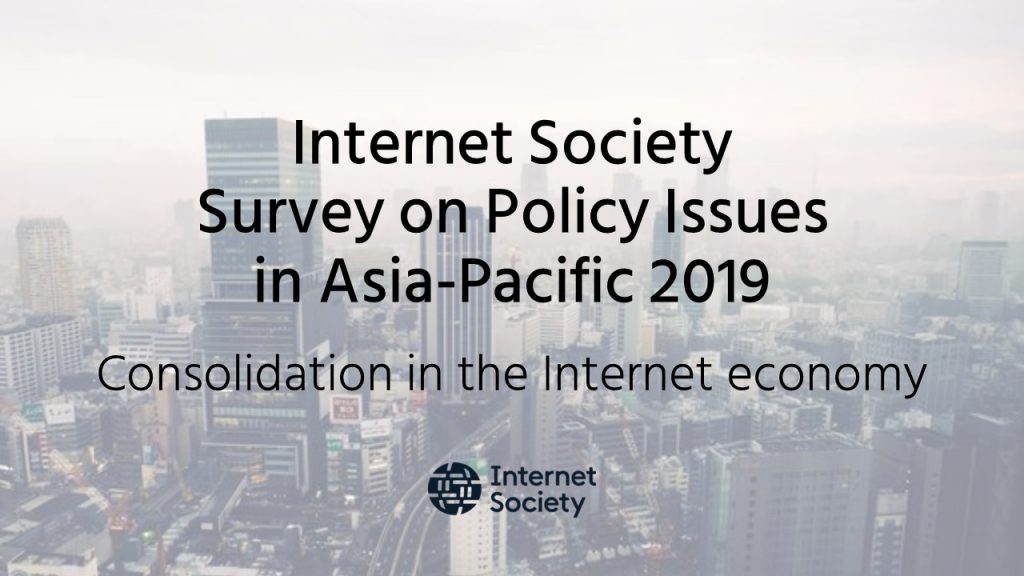
The Internet Society recently embarked on a year-long effort to explore the trends of consolidation in the Internet economy, and I write to sincerely invite you to share your views with us in the Regional Policy Survey 2019, an annual exercise of the Asia-Pacific Bureau of the Internet Society.
Your input is very important to us. It will help us understand the issue from your perspectives and produce a report to be released later this year. Ultimately, your input will help us come up with technical and policy recommendations for policymakers with the aim of preserving the Internet’s properties that give us the critical abilities to connect, speak, innovate, share, choose, and trust.
Please take 5-10 minutes to complete the survey, which covers all Internet users in Asia-Pacific. To show our appreciation, we will be offering 2 tablet computers in a lucky draw, and the winners will be notified by email after the survey closes on July 31.
Read about the previous installments of the survey.
Thank you again for your time and input.
The post Internet Society Asia-Pacific Policy Survey 2019 Now Open: Consolidation in the Internet Economy appeared first on Internet Society.
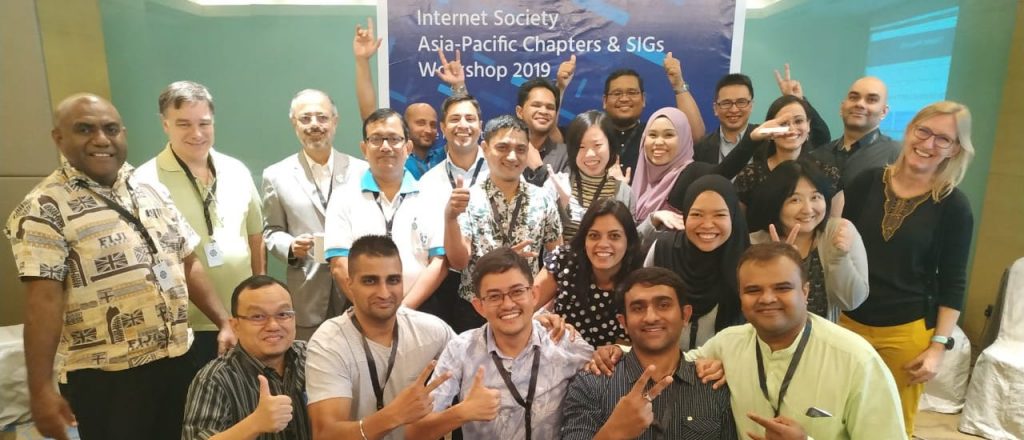
Earlier this month, 19 representatives from 14 local Chapters in Asia-Pacific gathered in Kuala Lumpur, Malaysia, for a two-day workshop to boost their capability in implementing the Internet Society 2019 Action Plan collaboratively and in a coordinated manner, and to maximize impact across the vast and fast-developing region.
Chapter leaders from Hong Kong, India, Japan, Malaysia, Pakistan, the Philippines, Taiwan, and the Pacific Islands, among other places, spent a weekend together. They learned from each other and planned the collective implementation of the Action Plan that has four focus areas: connecting the world, improving technical security, building trust, and shaping the future of the Internet.
Run by members across the world who support the Internet Society’s mission, Chapters are central to our work. They give us unique local perspectives on emerging Internet issues. The Regional Chapters Workshop, which is held yearly, is an important event that lets us strategize with Chapters on a wave of impactful local actions to amplify our regional voice and promote the organization’s mission – the Internet is for Everyone.
To help the Chapters carry out their work, the workshop focused on training and leadership in the focus areas, including IoT security, routing Continue reading
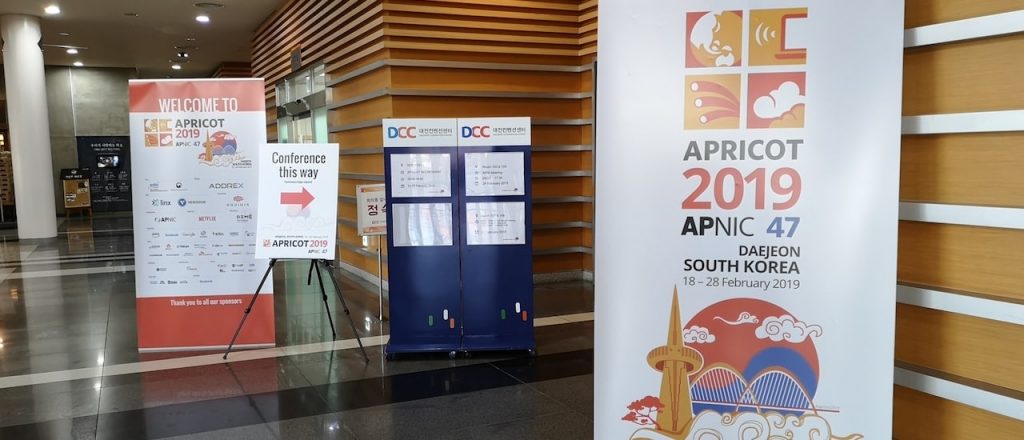
Asia Pacific Regional Internet Conference on Operational Technologies (APRICOT) 2019, said to be the largest technical conference in the region, drew hundreds of the world’s leading Internet engineers from over 50 countries to Daejeon, South Korea last week.
The Internet Society, a long-time partner of the event, contributed to the event by not only sponsoring over a dozen of fellows to travel there, but also made multiple high-profile appearances in various sessions, including the opening keynote speech.
The Internet Society’s President and CEO Andrew Sullivan delivered the keynote Up and Down the Stack Through a Nerd’s Eyes: Making the Internet Better the Internet Way with hundreds of people present, including Tae-Jeong Her, Mayor of Daejeon, and Dr Hee-yoon Choi, President of organiser the Korea Institute of Science and Technology Information (KISTI), a government research institute.
Now that so many people depend on the Internet, it is no surprise that businesspeople, policymakers, regulators, and politicians all want a say in the way the Internet evolves. But some of the proposals for the future of the Internet, Sullivan said, betray fundamental misunderstandings of the way the Internet works. The talk urged us all to continue to engage with the big questions Continue reading
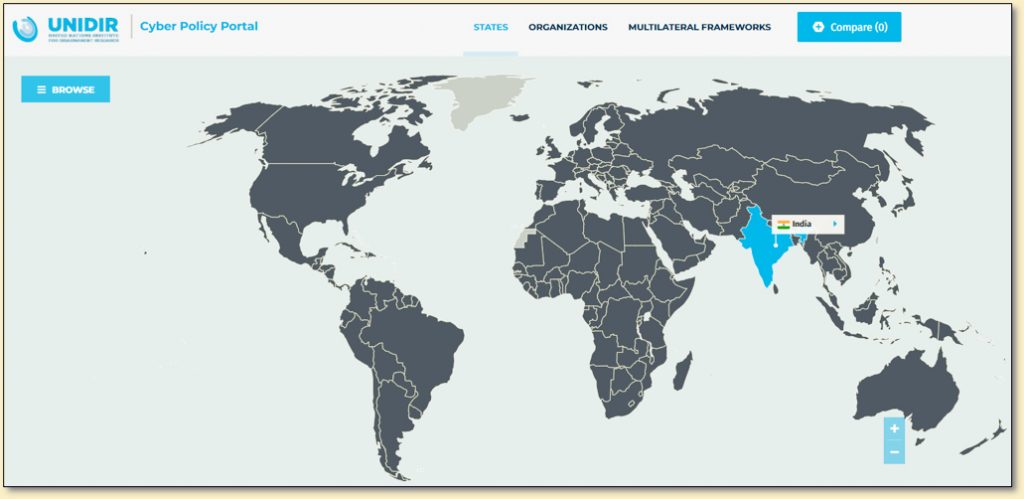
News of cyber attacks and personal data breaches frequently make headlines nowadays, particularly in Asia Pacific*, and every time a new incident happens, it deals a blow to the trust of some users. Since cyber threats are grave and growing, society must understand how policymakers are addressing cybersecurity concerns, and what can be done to strengthen trust.
A United Nations agency recently launched a tool to do exactly that. Against the backdrop of increasingly complex cybersecurity policies around the world, the portal aims to “enhance informed participation in key policy processes by all relevant stakeholders”, thus facilitating information sharing, capacity building, and trust and cooperation in cyberspace. We spent some time with it to evaluate the state of cybersecurity in Asia Pacific and to highlight the importance of the issue.
The Cyber Policy Portal, released this month by the United Nations Institute for Disarmament Research (UNIDIR), maps the global cybersecurity capability landscape, covering all 193 of the UN Member States, 13 intergovernmental organizations, including the Association of Southeast Asian Nations (ASEAN), and a number of multilateral frameworks.
The interactive map draws from public information and, where applicable, carries links to original documents. Systematically, it answers some of the salient questions Continue reading